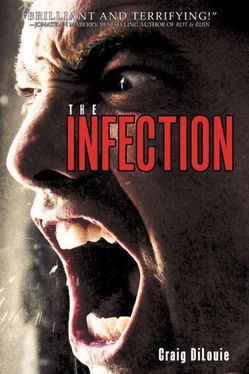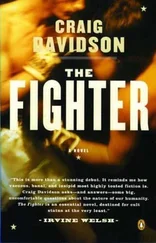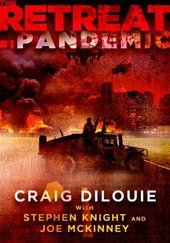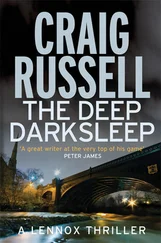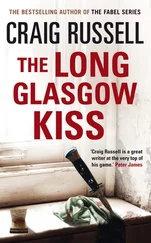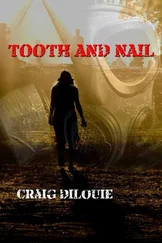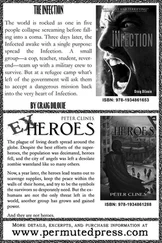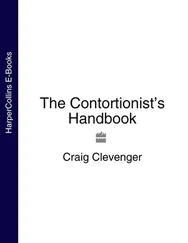“Thank you.”
“This means something to you, doesn’t it? The work, I mean.”
“It’s the only way I know how to be me,” Paul answers, surprising himself with the sudden insight. He wants to think about it more, but his tired mind cannot hold onto the threads.
“There will be a march within the next few days,” Strickland says. “A march of Christians trying to make things right around here. There’s more that can be done working together than by one man alone. You might want to give a listen to what they have to say. I’ll be there, too.”
Paul slaps the back of his neck to kill a mosquito. “I’ll do that.”
They pass the next few moments in silence. Paul finishes his smoke and grinds it out on the asphalt with his boot. Strickland blows out his candle. A dog howls in the distance.
“Can I tell you something, brother?” the pastor says quietly in the dark. “Can I speak to you as a man of the cloth? Will you hear a short confession?”
“Of course.”
“I always wondered if you could be a Christian and cry at a funeral. I mean, if somebody is going to heaven, shouldn’t we be celebrating? It’s the same here. The world is dying. Why are we so sad? Why do we cling to this miserable life? Maybe this is it, Paul. Maybe the Lord is calling us all home. If so, why do we resist the call? Why are we fighting God’s will? And why does it feel so horrible? Why does it taste like ashes? Why does it fill us with sadness?”
Paul has no answer, but he understands the essential question. He has asked himself the same question repeatedly in the past.
“I don’t know,” he says.
Sara would have an interesting answer, he is sure. His mind flashes to the battle between the Infected and the mob and what happened after the Infected overran the last knot of fighters: sketchy images of himself walking down the road, returning home to his wife. But he cannot remember what happened after that.
He is beginning to worry that he may have killed her.
♦
Ethan runs between the shanties, his finger itching and throbbing. He hears his pursuers shouting to each other. He believes he has lost them.
It happened suddenly.
The woman was telling him that the Marines had landed in New Jersey when her friends noticed what he was wearing.
He still wore scrubs from the hospital—the pants, anyway.
They thought he was a doctor.
Ethan spent the last few days at the processing center trying to locate his family, sleeping on the floor and living on handouts. The arrangement was not so bad. The school still has electricity and plumbing, the government’s way of demonstrating its strength. In some ways, he has been living in luxury compared to many people in the camp.
They sat on folding chairs, fanning themselves with their cardboard numbers. The woman told him she heard the Marines had landed in New Jersey.
He had already heard the rumor several times while waiting in the processing center. The Marines established bases along the coasts and the Army was striking inland, reinforcing the refugee camps and using them as forward operations bases in the campaign to retake the country.
It sounded a bit wishful, to say the least.
If it’s true, then where are they, why aren’t they here? Ethan asked, and didn’t bother listening to the answer. Rumors about the Army held no interest for him. All that mattered was the search.
While the woman continued talking, he began to notice how attractive she was. He realized that he could always move on. He could find somebody else and start a new family.
He did not want to do that. What was it Paul said to him when they talked about the people who left behind photos of their loved ones? I wouldn’t even know how , he said when asked if he could ever let go of those he left behind. Right.
Thinking about Paul triggered memories of hours sitting in the dim, hot belly of the Bradley fighting vehicle, rolling through a dying city on screaming treads.
The memory made him feel oddly homesick.
Ethan was wondering how the other survivors were coping when the woman’s friends approached. They noticed he was wearing scrubs and asked if he was a doctor. They had a sick friend and they were there to try to get him placed on the list for surgery—a service provided only to the most needy cases in this time of scarcity, as so many medical professionals were either killed or infected in the first days of Infection. The hospital sent them here, only to be told by the government to return to the hospital.
They reminded him that it was against the law for doctors to avoid work. Their eyes were gleaming, desperate.
When he told them he was not a doctor, one asked him if he had been a hospital patient. How could he have survived when the first wave of Infected rose from their beds? Maybe he had the disease but did not know it. Was he a carrier? Was he infecting all of them even now?
Ethan does not remember how things became violent. His memories blur at that point. He may have lashed out at them first; his mind simply blanked out. He became aware of shacks flying by, grim faces staring at him from doorways and over the flames of cooking fires. Lawn ornaments, hanging laundry, buckets and plastic jugs. He knocked something over. Curses filled the air.
He remembers when he used to be a pacifist. At school, kids would occasionally fight, and he would have to get between them and break it up. He hated doing it. Sometimes he would have night terrors over getting punched by a kid. In these visions, he would lose control, lash out and lose everything.
A truck rumbles alongside, filled with men laughing down at him. One of the men, a brown giant in T-shirt and jeans, stands and shouts, “Hey you! You want a job for the day?”
Better to ride than to run, he tells himself. He nods, gasping for breath, remembering that horrible day in the department store, as he ran blindly among the mannequins.
Large, calloused hands reach down and pull him up into the truck.
“ ¿Qué onda? ” they ask him.
He sits on the trembling bed of the truck as it lurches over the potholes. One of the men hands him a bottle of water. He takes a drink, wincing at the metallic taste, and hands it back.
“You got a trade?” the giant says to him.
“I was a teacher,” he says. “Now I just kill people.”
The men laugh, ringing him with their bearded faces. They spit over the side. He can smell onions on their breath. Some of them speak English while others chatter in Caló, an argot of Mexican Spanish common in the Southwestern states. Somebody passes around a flask and he smells distilled alcohol, probably made from the wheat and rice distributed in the weekly ration.
Booze is not the only thing you can make by distilling alcohol from mashed grains. Distilled alcohol makes a good anesthetic, antiseptic and preservative, he knows.
The truck stops in a cloud of dust in front of a large barn and the men jump out. The building is being used as a slaughterhouse. Cattle pace around a holding pen, agitated by the smell of blood. Draped in plastic garbage bags, butchers work on animals hung upside down by their hind legs, draining the bodies, removing the head, feet, hide and internal organs. The ground is soaked with blood.
The giant tells Ethan the beef is cut, wrapped and sent out immediately to the food distribution centers. The men here are paid in meat. A lot of it ends up in the market, bought and consumed fast before bacteria take hold. Most refugees put it into an eternal stew they keep continuously bubbling over fire, along with anything they can find such as wild onions and beans. The bones are fed to the camp dogs—pets brought by the refugees who now can no longer afford to feed them—whose presence is tolerated by the authorities because of their hatred of the Infected, making them good sentinels. The fat is used to manufacture soap and candles and biodiesel.
Читать дальше
